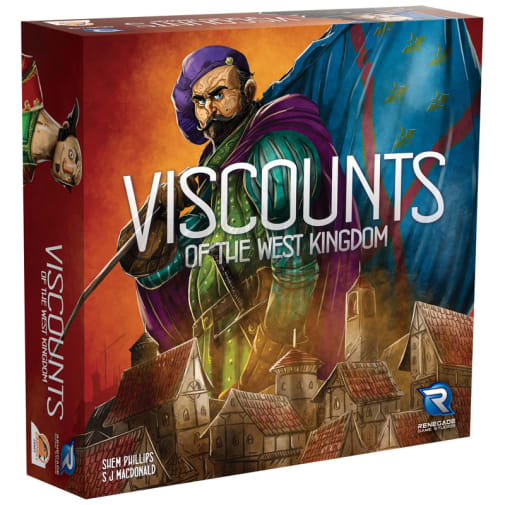This is the third in the West Kingdom trilogy on a historical timeline, and takes place in the Frankish empire in the year 980 AD, during a period in which the King is struggling to maintain peace despite many forces that are tearing away at his empire. All the elements needed to provide a challenging and enriching gaming experience with a large variety of interesting mechanics are a part of this game. There is a push and pull struggle between the forces of debt and prosperity, criminals and virtuous souls – using strategy, resources, patience and boldness to create the best possible balance required to gain the most victory points to win the game. As a Viscount, you are tasked with helping further the kingdom by acquiring resources, securing land deeds, constructing new buildings, transcribing manuscripts, working in the castle and helping to pay off debt. All these actions work toward the goal to make the population of the kingdom happy so that balance of power will not shift.
To start, each player begins with a hand of cards and varying resources. Each turn, a player adds a card to their playing board that gives them access to either trade for resources, transcribe a manuscript, build one of three types of buildings or send some of their population into the castle. Different actions also gain players virtue or corruption, which players track with counters on their player board. As their viscount moves on the main board, they choose a card to play that will help them navigate to the space that contains the action they desire to take as well as provide resources to empower their chosen action. After taking their chosen action, a player may choose to purchase the face up card that lies in the same sector of the main board that their viscount marker occupies. These cards add to their player card deck and provide additional resources and opportunities along with their starting deck to add variability to their turns. Central to this game are the stacks of debt and deed cards that players draw when required by card actions. There are opportunities to gain or lose victory points based on whether deeds are approved, and debts are paid off during the game. Once either the debt or deed decks have the last card drawn from them, the end of the game triggers and one more round is played. The person who has the most victory points is the winner of the game. Victory points are obtained from deed cards, constructed buildings, presence in the castle, and sets of transcribed manuscripts. Players lose points for unpaid debt cards. The player with the most victory points wins the game! There is also a solo mode included. I have thoroughly enjoyed my time playing this game and I highly recommend it. For 1-4 players with a 60 to 90-minute play time. ~Marsha

